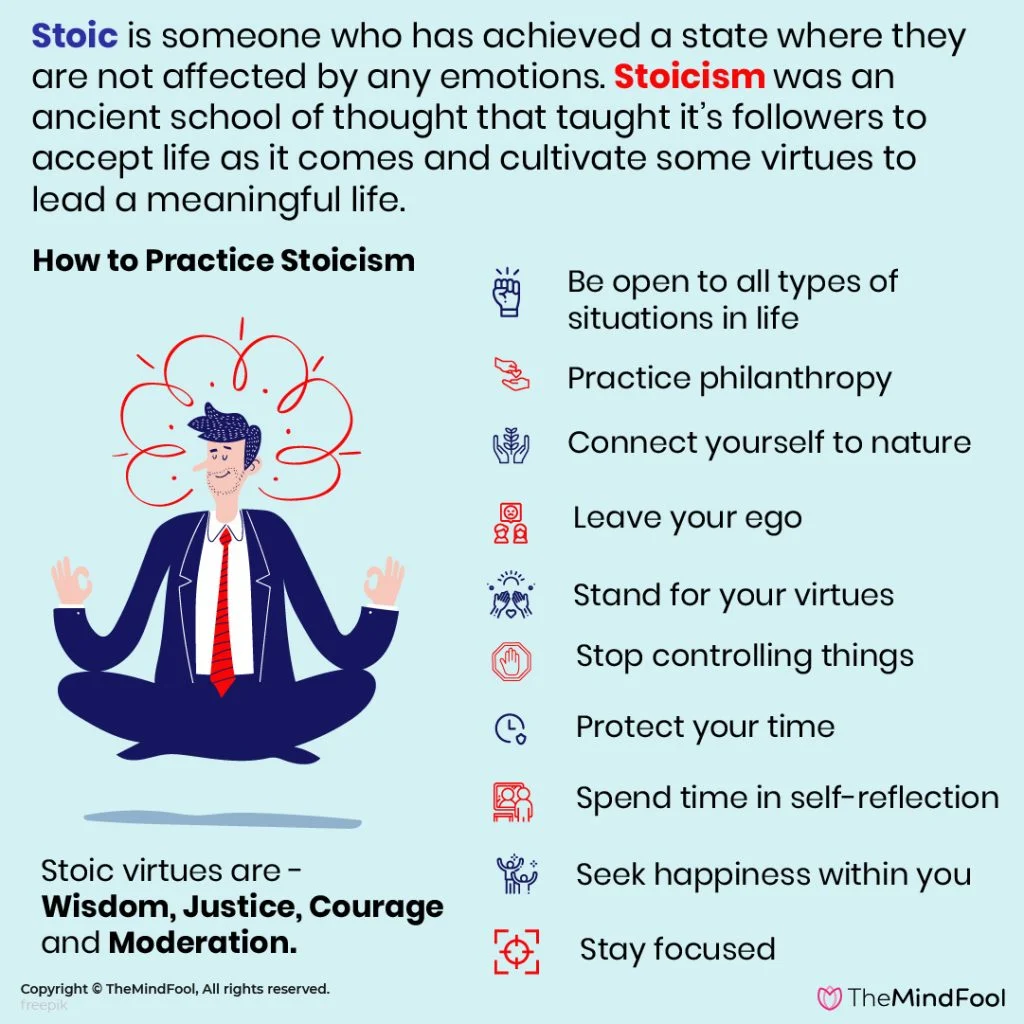A Complete Guide to Stoicism: How You Can Use this Ancient Philosophy to Live a Better Life
Stoicism was a distinguished school of thought in ancient Greece and Rome. Nowadays, the term “stoic” is loosely implied to describe someone who represses his feelings or has great enduring capacity. But in reality, stoicism is a deeper philosophical doctrine. Stoicism has its relevance even today. The doctrine is still practiced by wise people in our society because of its practical and simple approach.
Stoic Definition
Stoic is someone who has achieved a state where they are not affected by any emotions.
Let’s check the definitions of “stoic” as given by the popular dictionaries.
Cambridge dictionary gives this definition for stoic – “determined not to complain or show your feelings, especially when something bad happens to you.”
On the other hand, Merriam Webster gives the following two definitions:
“A member of a school of philosophy founded by Zeno of Citium about 300 B.C. holding that the wise man should be free from passion, unmoved by joy or grief, and submissive to natural law.”
• “One apparently or professedly indifferent to pleasure or pain.”
Oxford Learner’s Dictionary suggests: “A person who is able to suffer pain or trouble without complaining or showing what they are feeling.”
Collins dictionary states: “A member of the ancient Greek school of philosophy founded by Zeno of Citium, holding that virtue and happiness can be attained only by submission to destiny and the natural law.”
What is stoicism?
SUMMARY
Stoicism was an ancient school of thought that taught it’s followers to accept life as it comes and cultivate some virtues to lead a meaningful life.
Stoicism was a concept formulated by the Greek philosopher, Zeno of Citium in the early 3rd century B.C. in the Hellenistic period.
After losing everything in a shipwreck, Zeno became a student of the Cynic school of philosophy. When he decided to start his school he did not even have the money to buy or rent a space. So, it was on the streets of Athens where Zeno met his students. He taught his ideas under the roofed colonnade, Stoa Poikile, hence his philosophy got the name stoicism.
His school was open for anyone who would listen. According to this school of philosophy, “virtue is the only good.” This philosophy is based on the idea of seeking a path to happiness or eauda imonia.
The basic concept of stoicism revolves around 3 major ideas –
• View yourself and the world with its people objectively and accept their nature as they are.
• Discipline your mind to prevent yourself from being controlled by pleasure or pain.
• Realize what is within your power and what is not. And then act on those factors under your power and leave those beyond your control.

The Stoics believe that we are not affected by events. It’s only how we react to them. Stoicism does not teach you to let go of your emotions. Rather, it formulates to transform them by Asceticism which is the voluntary practice of abstinence from worldly pleasures. As a result of that, a person will develop clear judgment, attain inner calm and would be freed from his sufferings.
Stoicism beliefs are based on self-control and fortitude to overcome all destructive emotions in our minds. Stoicism is not a set of rules or beliefs. Rather, it is a daily practice, a way of living life. It involves training and practice of logic that is based on natural laws.
Stoic philosophy
SUMMARY
Stoic philosophy was the most practical of all the ancient school of thoughts because it urged to lead an idealistic life based on courage and self-control.
In ancient Greece and Rome, there were 5 main philosophical schools, Stoic being one of those: Aristotelian, Platonist, Stoic, Epicurean, and Skeptic. The Stoic school of philosophy founded by Zeno of Citium. It was considered as the most practical philosophy because it preached to live in the present moment.
The Roman Emperor Marcus Aureliusis considered as the most important stoic philosopher who popularized this school of philosophy. This Hellenestic philosophy as taught by the early stoics was not a religion. It was an art of living. The philosophers urged their followers to live in agreement with nature. The Stoic philosophical thought became the most widespread of all five schools of thought because it had a simplistic approach.
The Stoic philosophers did not give complicated theories instead they formulated simple rules to live life to the fullest. Stoic logic introduced by the Stoic philosophers of ancient Greece is called propositional logic. This was considered as one of the two best systems of logic in ancient times.
The three most important stoic teachers were –
• Marcus Aurelius (121 AD – 180 AD), the Roman Emperor
• Seneca the Younger (c. 4 BC – AD 65), the political advisor
• Epictetus (50 AD – 135 AD), the slave turned teacher
One of the most famous stoic practitioners was Marcus Porcius Cato or Cato the Younger. He was a remarkable Roman senator who opposed Julius Caesar. Another notable figure was the Stoic philosopher Gaius Musonius Rufus of the 1st century AD who was sent into exile during the reign of Roman Emperor Nero. He was the teacher of Epictetus.
The Stoic philosophy was initiated by the Hellenestic Greeks and later embraced whole-heartedly by the Romans. Stoicism became immensely popular because of its realistic approach. It taught people to lead a morally idealistic life. Its simplicity has a strong appeal to people even till date.
This ancient philosophy was based on the principles of self-control and the courage to overcome any destructive emotions. Stoicism teaches to become free from passion and accept adversities in life. However bad it seems we do not crush to pieces if we were to face a natural calamity. Why? Because we know those can happen. Then why should you be shocked if you face betrayal, loss, enmity, or any deep trouble?
Stoics do not believe in consoling someone when they face difficulties. Because to them hope will only raise you high enough to cause an inevitable fall that will be even more painful.
Therefore, instead of expecting and hoping why not stay open and aware that life indeed brings pain? According to Stoic philosophy, only then you can face the challenges of life bravely. You have to practice staying indifferent towards whatever incidents in your life so that you are not drowned in the sea of emotions.
The Stoics embraced an attitude called amor fati or the mindset in which you embrace every moment. Even if the situation is a challenging one, you accept it and make the best out of it instead of trying to escape from it.
The Stoics participated in worldly matters, performed all their duties but believed that one’s fate is determined by the divine power. Therefore, they believed if you are bound to suffer you must do so. You must uphold your virtues but you should not be disappointed if things do not happen the way you wanted.
The Stoics allowed participation of people of all ranks. So, their philosophy was popular among the aristocrats as well as the slaves. This was a unique characteristic in the conservative society of the Greeks and Romans that all people were welcome to practice this philosophy.
The Hispano-Roman Stoic philosopher, Lucius Annaeus Seneca was charged with conspiracy against Emperor Nero and was sentenced to commit suicide. After trying to explain his innocence calmly when the Emperor did not believe him, he accepted his death sentence with dignity. This incident demonstrates the Stoic philosophy – courage in front of adversity.
Stoic virtues
SUMMARY
The four Stoic virtues were – Wisdom, Justice, Courage and Moderation.
The stoics believed in The Four Cardinal Virtues – Wisdom, Justice, Courage and Moderation.
1. Wisdom
“The wise man is neither raised up by prosperity nor cast down by adversity; for always he has striven to rely predominantly on himself, and to derive all joy from himself.”
–Seneca
Stoicism teaches you to practice wisdom. It simply means to recognize and accept things as they are without labeling them as good or evil. You only have to choose your decisions and act accordingly. Between the stimulus and response, there indeed is a space. In this space, you choose how you would respond.
2. Moderation
“Wealth consists not in having great possessions, but in having few wants.”
–Epictetus
It is the knowledge of knowing what’s essential for you and doing only that. We have the desire to possess several materialistic things and to accomplish so much in one lifetime. But are those even necessary? Following this virtue, one can learn self-control. For if you don’t practice self-control you will keep wasting time from your limited lifespan and keep bringing more pain to yourself.
3. Courage
“If it’s endurable, then endure it. Stop complaining.”
–Marcus Aurelius
We need the courage to persist and resist for thriving. Stoicism teaches this virtue to face any challenges, misfortune, or even death. Courage enables you to face any situation of life. Have the courage to hold your principles, to take risks, and to speak truthfully. Courage sharpens your character.
4. Justice
“Live out your life in truth and justice, tolerant of those who are neither true nor just.”
–Marcus Aurelius
Marcus Aurelius stated that among the Four Stoic Virtues, justice is the most crucial one. Because it is the “source of all the other virtues.” What is so grand about courage if you use it only for your selfish ambitions? What good can wisdom do if you don’t apply it to help others? And what will you do with self-control if not for the benefit of mankind? This virtue teaches us to understand our duty to others. It is the act of being righteous and upholding truth over everything else.
Stoic Ethics
SUMMARY
Stoic ethics speculated the need to practice the virtues to stay happy.
Stoic doctrines have both faced criticisms and appreciation throughout history. The Stoic moral was to lead a virtuous life devoid of all passions. They believed that a man who practices all the virtues is a “wise man.” According to them, the only thing that leads to happiness is a virtue. And the only thing that is bad or evil and brings misery is vice or corruption of reason. All other things fall into the category of “indifferents” because they were neither good nor evil.
Within the class of indifferents, the Stoics marked a class that they called “preferred indifferents” which are “according to nature.” The preferred indifferents include life, pleasure, beauty, health, strength, reputation, wealth and noble birth. On the other hand, the dispreferred indifferents include pain, weakness, poverty, disease, death, ignoble birth and low repute.
Stoic principles
SUMMARY
The eight principles of the Stoics were – Nature, Law of Reason, Virtue, Wisdom, Apatheia, Pleasure, Evil and Duty.
“The goal of life is living in agreement with Nature.”
–Zeno of Citium
There were mainly eight principles of the Stoics. These are –
1. Nature
Stoics call nature a rational entity.
2. Law of Reason
The universe follows the law of reason. You cannot escape the natural laws, so follow those intentionally.
3. Virtue
If you lead your life following the natural laws, you are indeed virtuous.
4. Wisdom
It is the source of all other virtues. If you are wise you will not let external circumstances affect you.
5. Apatheia
Passion and emotions have no reasons. So, you should avoid all the intense emotions.
6. Pleasure
It is neither good nor evil. You can have pleasure as long as it does not interfere with your practicing the virtues.
7. Evil
Unexpected, unpleasant events such as illness, poverty or death are not evil.
8. Duty
You should practice virtue not for having pleasure but as a duty towards the world and its people. source

